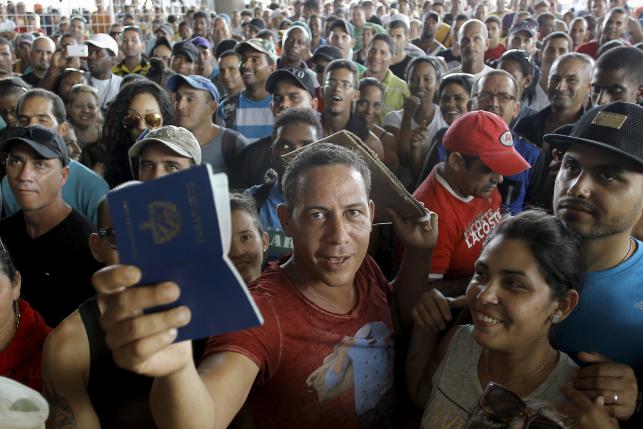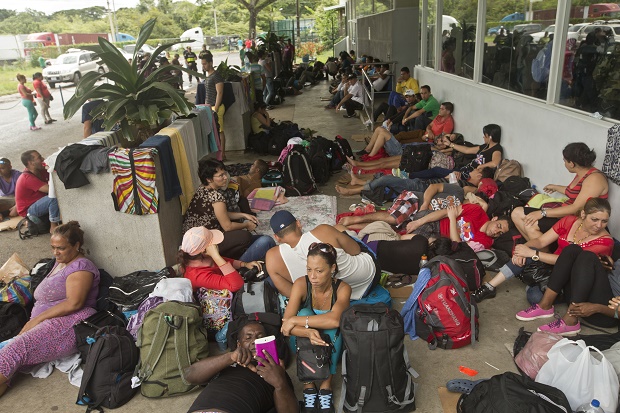Costa Rica News – Costa Rica will offer temporary protection to refugees fleeing Central America for the US, the Obama administration announced on Tuesday, following an admission by officials of its failure to address the surge in refugees fleeing violence, rape and kidnappings.
“Our current efforts to date have been insufficient to address the number of people who may have legitimate refugee claims,” said Amy Pope, deputy homeland security adviser, in a press call on Tuesday morning.
Central Americans from Honduras, El Salvador and Guatemala have fled their countries in their thousands. As violence in the Northern Triangle spiked in 2015, the number of asylum seekers from these countries rose to more than 110,000 – a fivefold increase from 2012. Most are seeking refuge in Mexico and the United States.
Most are fleeing violence inflicted on their communities by brutal gangs who regularly target civilians, raping, killing and kidnapping them in exchange for exorbitant ransom payments.
To address the needs of those who urgently need protection, the administration is partnering with Costa Rica, as well as the United Nations, which will help identify the most vulnerable people in Honduras, El Salvador and Guatemala.
“By themselves, today’s actions will not solve this challenge, but are steps in the right direction and are a further example of the United States’ commitment to resolve the situation,” said Anne Richards, the state department’s assistant secretary for the bureau of population, refugees and migration.
Richards said Costa Rica was aiming to host 200 individuals at a time for six-month periods under the new protection transfer agreement (PTA). Only those who have been prescreened by state department officials in their countries of origin will be eligible for travel to Costa Rica. People who travel to the country on their own will not be accepted into the program.
Those transferred to Costa Rica will undergo refugee processing before being resettled to the US or another country, but it was not clear what would happen if they could not be relocated within six months.
Pope said the partnership: “is really to address those who are so vulnerable that there is no option for them to remain in the region while their applications are processed.”
The Central American minors program is being expanded to extend eligibility for the program to certain qualified family members. This comes after more than 9,500 applications were filed for the program, most of those in the past nine months, said Alejandro Mayorkas, deputy secretary at the Department of Homeland Security.
The following people who accompany a qualified child who is aged 21 or under and not married may now be considered for the program: siblings older than 21 who have a lawfully present parent in the US; biological parents who have been in the origin country with the child; and caregivers who are related to a parent lawfully present in the US.
As part of the expansion, officials also highlighted an agreement reached between Barack Obama and the Mexican president, Enrique Peña Nieto, last Friday to increase Mexico’s capacity to process asylum claims. Earlier this month, both countries agreed to improve access to asylum for Central Americans fleeing violence during a two-day meeting hosted by the UN refugee agency.
Immigrants’ rights groups, however, were skeptical that the expansion could meet the high demand for asylum.
Greg Chen, director of advocacy at the American Immigration Lawyers Association (AILA), said the group was pleased the administration was directing more resources to refugees, but was concerned the plan still left gaps in protection for vulnerable groups.
Chen said the expansion did not appear to address individuals who were already in the US and had legitimate claims for protection. “That policy of aggressive enforcement, aggressive detention and removal of these asylum seekers from Central America is in contradiction with efforts to provide real protection to these individuals,” Chen said.
Maureen Meyer, senior associate for Mexico and migrant rights at the Washington Office on Latin America, was also concerned that the expansion still would not affect people who had to flee their home countries immediately and could not wait for the prescreening interviews by US state department officials.
“What do you do in those situations where someone quite literally made a decision one day to the next based on threats or aggression or something that may have happened to them or their family members?” Meyers said. “They’re not going to want to wait around to get an appointment.”
But Meyer said the announcement was “a very important step in the right direction” because it is the administration acknowledging the flow of people from Latin America includes potential refugees, not just economic migrants.
The US secretary of state, John Kerry, introduced the plan to expand the Central American refugees program in January, but Tuesday’s announcement specifies some of the measures hinted at in his announcement, which came with the news that 21,469 undocumented children and families from Central America were detained at the US border in the last three months of 2015, a surge that echoed the migrant crisis of 2014.
“We can both maintain the highest security standards and live up to our best traditions as Americans by welcoming those in need of help to our great country,” Kerry said in January. “That is who we are. That is what we do. That is how we wrote our history. That’s how we became who we are. And we dare not turn our backs on future people, generations seeking the same set of opportunities. We have the ability to protect ourselves even as we remain a country that welcomes migration.”
Brian Hansford, a spokesman for the United Nations High Commissioner for Refugees, said: “UNHCR warmly welcomes today’s announcement as an important step in the right direction.
We have expressed continued concern about the situation in Central America and today’s announcement puts forward a solid foundation for a regional response. UNHCR looks forward to continuing to work with all governments and civil society partners in the region to address the pressing humanitarian challenge.”
From The Guardian


